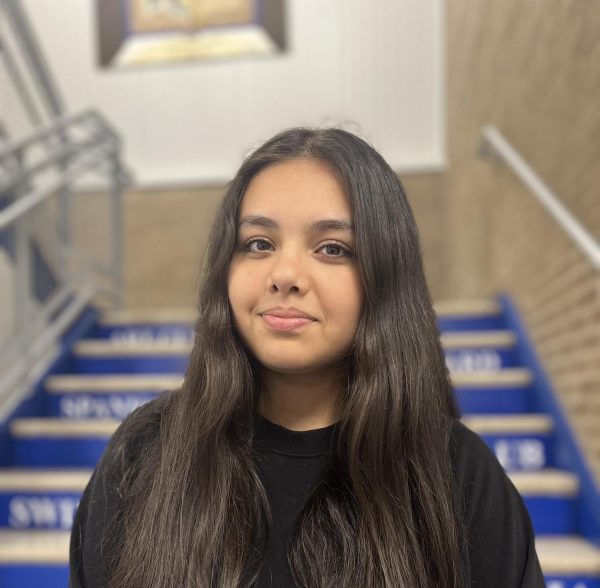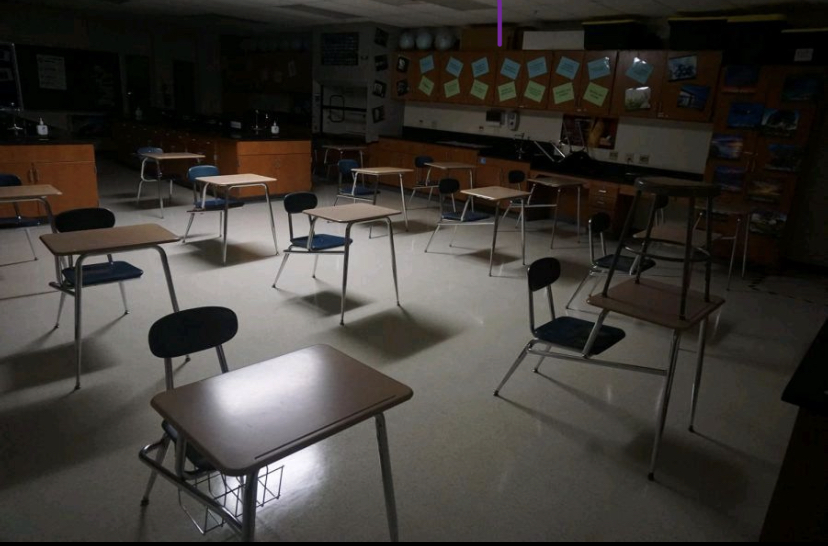From beds to desks: a look into post-online learning
After a year-and-a-half of logging into Zoom, sitting behind screens with cameras off, and laying in beds with pajamas on, the vast majority of LZHS students are back on campus, and both teachers and students are re-discovering the costs and benefits of being back to full time in-person learning.
“I definitely noticed that coming into this year, there was definitely a lot more work (and) a lot more stressful. That kind of has to do with last year and not having as much work, I think, because teachers just didn’t want to put that much pressure on everyone. (But now) you have to work really hard to learn stuff because you don’t get to use your notes on tests and quizzes either,” Patrycja Szot, sophomore, said.
Emme Langefeld, junior, expressed similar sentiments and says that online learning gave students more “freedom and flexibility with assignments and being able to retake everything.” Although she says she didn’t learn as much, she misses having an easier time in being able to keep up with schoolwork, tests, and extracurriculars. However, even though she had an easier time, she says having to learn from home forced her to become more self-sufficient in her learning.
“I can rely a lot more on things like my textbooks and online resources, as opposed to just teachers. I don’t need to ask teachers for guidance on everything. I think that being more self-motivated and self-sufficient really helps me, to not just do the assignment but [also] know what I need to do to really succeed in each class,” Langefeld said.
Margaret Reynolds, English teacher, however, says that many students were forced to “become self-reliant” because of the difficulty that came out of teachers not being able to easily connect with students over Zoom.
“When you build relationships in a classroom, you’re in the same room, and you have four walls surrounding you. It’s so different when you’re in front of two different screens in two different houses,” Reynolds said. “I would say it was difficult to build any sort of relationship, to trust and understand the character of each student, and to know what I needed to do as a teacher to support them.”
This was an issue that Reynolds says was worried about because of the importance in teachers being able to build relationships with their teachers. She says that the reason why teachers create “getting-to-know-you activities” in the beginning of the year is because most teachers want to be able to connect with their students. Creating any form of connection allows teachers to know how to best support their students, she says.
Sophomore Morgan Krieter, agrees, saying that connections between her and her teachers is what allowed her mindsets about certain classes to change when she made the shift from learning fully online to fully in-person.
“I took Honors Biology, and I’m not naturally inclined to be a science person. I can do it, but I need a little bit of help. So I [took] the class, and I was doing fine. I didn’t really like it, though. And then I came back; we had eight weeks left [in the spring semester],” Krieter said. “In those eight weeks, biology [became] my favorite class to go to every day. Most [of that] was because of Mrs. Hopkins, our biology teacher. You can feel her passion for biology, and being able to teach it, all while you’re sitting there.”
The relationships students gain from in-person learning aren’t limited to just teachers. Langefeld says that they also extend to make connections and friendships with other students.
“I’m definitely meeting a lot of really really awesome people this year that I never really thought I would meet. These are people I [already] knew, but I’m really talking to them now. It’s great, and I wish I knew them earlier,” Langefeld said.
Krieter agrees and says that she was also able to make more social connections due to in-person learning. It makes her happier to get herself ready for the day and be able to interact with all of her friends. She says she never realized how important social interaction was to her life until it got taken away from her once everyone was forced into learning from Zoom. However, even though her social interaction with friends has increased, Krieter says she misses the amount of interaction she was able to have with her family.
“I miss [being at home] because it’s very weird going from being with your family all day — especially my family. We’re talking to each other, we’re yelling through the rooms and we [talk] at each other all day. I don’t think I [went] half an hour without talking to my mom when [I was] e-learning and then come in here and only be able to text her once a day when the WiFi is good,” Krieter said.
But even though there are aspects of online learning that Langefeld says she misses too, such as the freedom and flexibility it gave her, she also expresses excitement for “the culture” that the high school had before COVID-19 forced everyone “to go to school from screens.”
A huge part of this culture was the school spirit that revolved around “important moments of high school” such as football games, homecoming, and being able to connect with friends and other students, Langefeld says. She credits a part of this sense of excitement to the fact that she believes she was “robbed” of some highschool experiences.
“I feel like a big part was taken away from us, our entire sophomore year was weird. [It’s] not really a super important year in the grand scheme of things, but it’s [still] a pretty important year. I didn’t get to do stuff,” Langefeld said. “I didn’t get to go to school and choir concerts and stuff. I missed out on a big part of my high school career, a good fourth of it, and the second half of freshman year which is just really sad to think about.”
As a reminder to herself and others, Langefeld says to stay optimistic and that “there is still room for me to make the most out of my junior and senior year and just make the most memories I can.”

Coming back for her last year on Bear Facts, Gurneer will be Spotlight Editor for the second year in a row. Outside of Bear Facts, she participates in...

As a senior, this will be Adam's third year in the journalism program, and second year of being on staff, where he is taking on the role of the Live Media...

